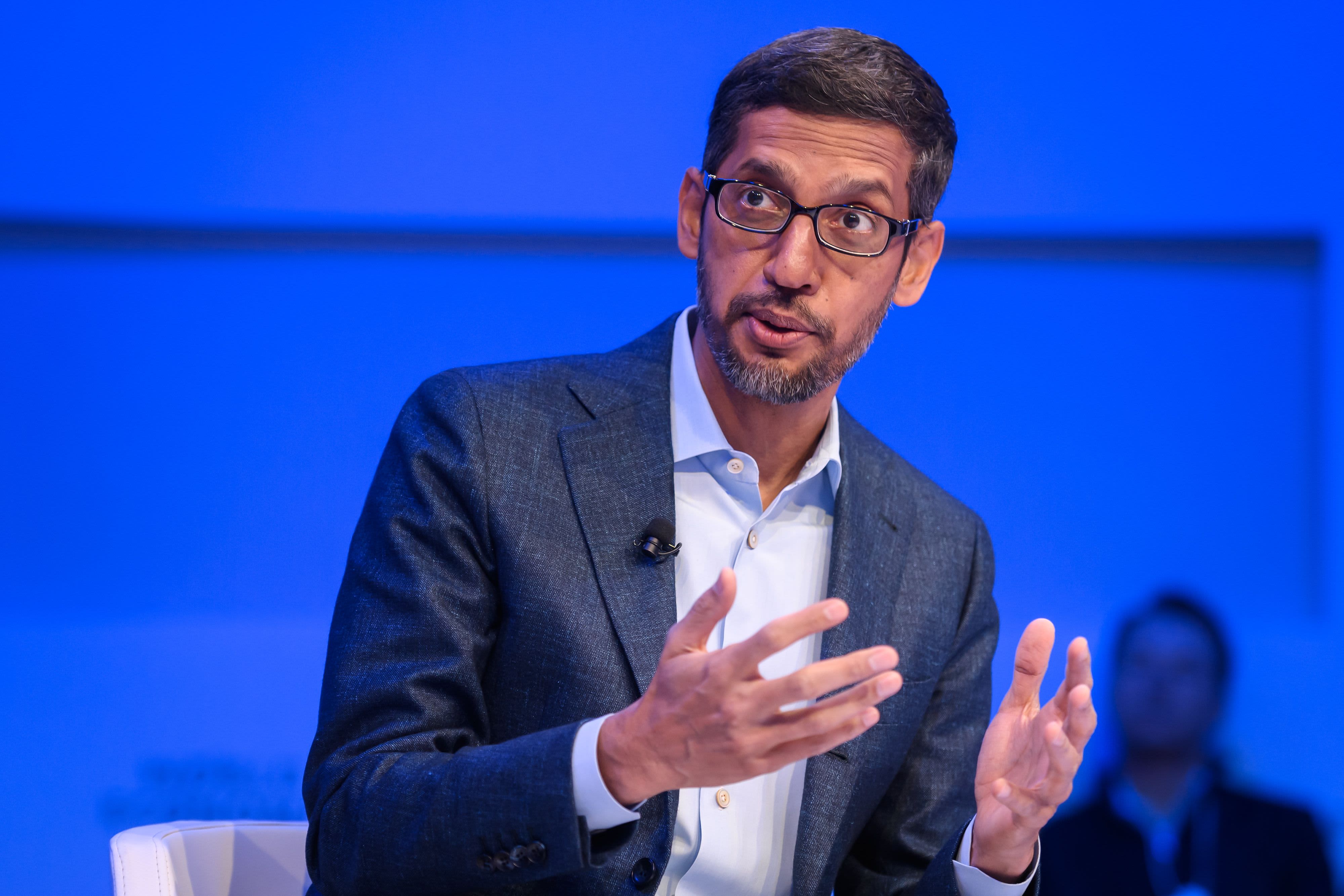Alphabet CEO Sundar Pichai gestures during a session at the World Economic Forum (WEF) annual meeting in Davos, on January 22, 2020.
(Photo by Fabrice COFFRINI / AFP) (Photo by FABRICE COFFRINI/AFP via Getty Images)
Google on Sunday disputed claims from a group of attorneys general, led by Texas’ Ken Paxton, that its ad-buying arrangement with Facebook was anticompetitive.
In a blog post, Google’s director of economic policy Adam Cohen called the lawsuit from 10 Republican-led states “misleading.” The statement is Google’s most extensive response yet to the lawsuit, which is also the only one to name Facebook as a “co-conspirator” (though it does not name Facebook as a defendant). The company faces two other complaints from a bipartisan group of attorneys general and from the Justice Department.
The statement followed a New York Times article earlier on Sunday that described more details of the alleged arrangement, citing an unredacted draft of the complaint. The Wall Street Journal previously reported on the unredacted draft in December.
According to that version of the complaint as described by the Times, a Google executive saw an “existential threat” in Facebook’s 2017 announcement that it was testing a move into the ad space. Facebook was considering a project in header bidding at the time, a form of ad buying that allows publishers to circumvent dependence on Google’s platforms.
But that project came to an end when the two reached an agreement in 2018 for Facebook to become a partner in Google’s Open Bidding project, which allows competing ad exchanges alongside its own, but takes a fee from winning bids. That agreement was unlike others offered to partners in the alliance, according to members interviewed by the Times who declined to be identified for fear of endangering their relationship with Google.
Google allegedly offered Facebook more time to bid for ads than other members of the alliance, according to the documents and interviews presented by the Times. Google also allegedly offered Facebook more insight into who would be on the receiving end of ads and a guaranteed “win rate” for bids, the Times reported. The two agreed to “cooperate and assist” each other in the event the agreement was investigated for competition concerns, the documents showed.
In the blog post responding to the allegations, Cohen defended Open Bidding as a tool that benefits publishers. Cohen wrote that Open Bidding addresses some of the problems with header bidding, like slow-loading pages, and that header bidding is still a growing market, citing a 2019 eMarketer report.
Cohen noted that Google’s agreement with Facebook had been widely reported at the time and said that it simply allows Facebook and its advertisers to participate in Open Bidding.
“We absolutely don’t,” manipulate auctions in Facebook’s favor, Cohen wrote. The agreement doesn’t prevent Facebook from pursuing header bidding and still requires the company and its advertising network to make the highest bid to win, Cohen wrote. He also said that Google’s fees for advertisers are lower than the industry average and said there is plenty of competition in the space.
“Partnerships like this are common in the industry, and we have similar agreements with several other companies,” a Facebook spokesperson said in a statement. “Facebook continues to invest in these partnerships, and create new ones, which help increase competition in ad auctions to create the best outcomes for advertisers and publishers. Any suggestion that these types of agreements harm competition is baseless.”
One day after the Texas-led group filed its lawsuit against Google, a bipartisan coalitions of 38 states and territories sued Google over another set of antitrust concerns, including allegedly exclusionary contracts and discriminatory behavior against competitors on its search results pages. The Justice Department and a group of Republican-led states earlier sued Google over some of the same concerns over contracts.
Facebook separately faces complaints from the Federal Trade Commission and attorneys general from 48 states and territories claiming it violated anti-monopoly law.
